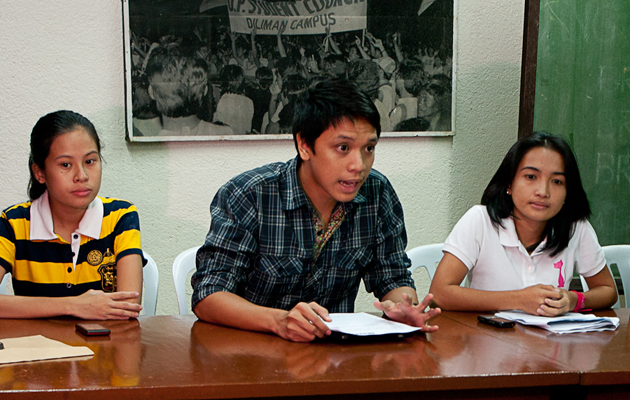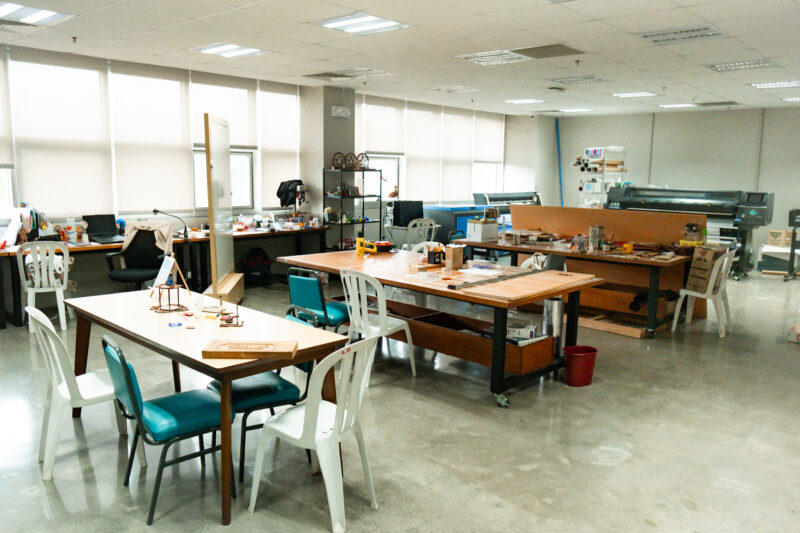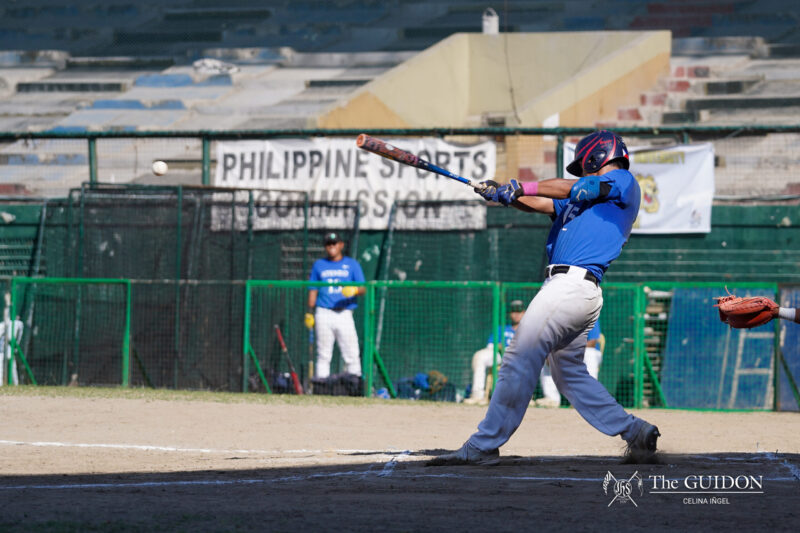TWO YEARS into office, the Aquino administration has largely failed to resolve widespread human rights violations.
This, according to the College Editors Guild of the Philippines (CEGP) National President Gidget Estella, is enough to say that President Noynoy Aquino’s administration has been worse than the previous one under Gloria Macapagal-Arroyo.
“Duguan ang ‘matuwid na daan’. Kung sinabi niya na prioridad niya ang human rights noong siya ay tumatakbo pa lang, ang mga kalagayan ngayon ay iba ang sinasabi. The truth says otherwise (The ‘straight path’ is a bloody one. If he said that he would prioritize human rights when he was still running for president, the events show a different situation today. The truth says otherwise),” Estella said in a press conference held at the Office of the Student Regent, Vinzons Hall, University of the Philippines Diliman on June 30.
Yesterday marked Aquino’s second year as the country’s president since he took oath on June 30, 2010.
Others who spoke during the conference were Gail Orduña, chairperson of the Student Christian Movement of the Philippines and Rafael Labunog, Editor-in-Chief of the Monthly Quest, the official student publication of the Quezon City Polytechnic University (QCPU).
Recurring HR violations under Aquino
Estella further said that instances of human rights violations have not been alleviated under Aquino, citing 76 cases of extra-judicial killings, 96 cases of torture and 363 political prisoners to date.
She also said that from July 2010 to October 2011, the number of violations reached more than 32,000, including cases that involve the military and violent dispersals of protesters under the police.
The government’s failure to make suspects of the Maguindanao massacre in 2009 accountable also highlighted the on-going culture of impunity in the country, she said. According to Estella, “Palagi na po natin itong [culture of impunity] naririnig. Ang ibig sabihin po nito, ang isang tao ay kayang barilin ang isa pang tao in broad daylight nang hindi natatakot na siya ay mananagot sa batas. Dahil po rito ay nag papatuloy ang human rights violations sa ilalim ng termino ni Aquino. (We have always heard about culture of impunity. This means that a person can gun down another person in broad daylight without fear of being punished under the law. Because of this, there have been continuing human rights violations under Aquino.)”
Orduña recounted the case of Maricon Montajes, 21, film and audio visual communication student in UP Diliman, who went to document farmers in Batangas in 2008. Montajes was arrested in 2010 for allegedly false charges made against her by members of the military.
“Ngayon po, dalawang taon na po siyang nakakulong. Siya po ang pinakabatang political detainee sa kasalukuyan (She has been detained for two years now. She is currently the youngest political detainee),” Orduña said.
Oplan Bayanihan criticized
Meanwhile, the Armed Forces of the Philippines’ (AFP) counter-insurgency plan, called “Oplan Bayanihan,” was also reported to have resulted to more human rights violations, which the organizers of the press conference said makes it no different from “Oplan Bantay Laya” under Arroyo’s term.
In line with this, Estella described the current situation in the province of Quezon. She explained that the said province has been subject to militarization, which has led to 125 victims of human rights violations since 2011. This includes one enforced disappearance, four cases of torture and 15 cases of illegal arrest and detention.
The AFP has deployed eight infantry battalions in two districts of Quezon. A fact-finding group called “Mercy Mission” has pointed out that the conflict between civilians and the military within the province arises from Aquino’s development projects in the resource-rich province. These projects are said to uproot residents in the area.
“Itong mga proyektong ito ay pagmamay-ari ng gobyerno at mga pribadong kumpanya… At hindi rin po natin maiiwasang isipin na kaya nag-deploy ng bata-batalyong militar ay upang iresolba ang tunggaliang ito sa panig ng gobyerno at mga pribadong kumpanya (The government owns these projects and private companies… It is hard not to think that the deployment of such army battalions is to settle the conflict to the advantage of the government and private companies),” Estella said.
State of campus press freedom
The CEGP, Estella shared, has also been subject to surveillance of alleged military personnel. In a press statement, CEGP narrated how its officers and an editor of The Pillar, the official student publication of the University of Eastern Philippines, were suspiciously followed by suspected military staff members during a convention in Samar last February.
Moreover, she said that human rights violations even within educational institutions have also marred Aquino’s term thus far. This, as described by Estella and Labunog, is particularly evident by looking at issues regarding campus press freedom.
On the one hand, Estella discussed the current dysfunction of The Dawn, the student publication of the University of the East, whose editorial board is also facing a libel case.
The said university’s administration purportedly halted its operation, which has affected its release of budget for printing, and directed current staffers to take another qualifying exam.
On the other hand, Labunog expressed his sentiments over the Monthly Quest’s delayed release of budget and the QCPU administration’s removal of the publication’s office and equipment.
“Sa tuwing kami ay nagpa-publish ng diyaryo, dumadaan kami sa isang kuwestiyonableng proseso kung saan pagkatapos ng editing ng editorial board, kailangan po naming i-submit ang soft copy ng aming diyaryo sa administrasyon (Every time we publish the newspaper, we undergo a questionable process where we have to submit the soft copy of the newspaper to the administration),” he said.
Labunog said that his appearance at the press conference required him a lot of courage. “Hindi birong tapang ang kinailangan ko para humarap sa araw na ito dahil alam na man nating lahat na ang QCPU ay under po siyang Quezon City Hall, so mataas na opisyales ng gobyerno ang aking ikinakaharap sa pagharap dito. (The courage it took for me to appear today is not a joke, because we all know that QCPU operates under the Quezon City Hall, meaning I am facing high government officials by showing up here).”
The speakers of the press conference agreed that the youth has been among the most affected sectors in terms of human rights violations under the Aquino administration.
They have also refused to acknowledge Aquino’s proclaimed achievements, in light of the State of the Nation Address to be delivered on July 23.
“Sigurado na naman po, sugar-coated rhetoric na naman ang sasabihin ng ating pangulo. Ngunit kung titingnan po natin sa aktwal, wala naman po talagang output hindi lang po sa isyung human rights kundi maging sa iba’t ibang aspektong governance (For sure, the president will deliver another sugar-coated rhetoric. If we will evaluate what’s actually happening, there has been no output not just on issues of human rights but also in other aspects of governance),” Estella concluded.
Updated 7:02 AM, July 2, 2012.






